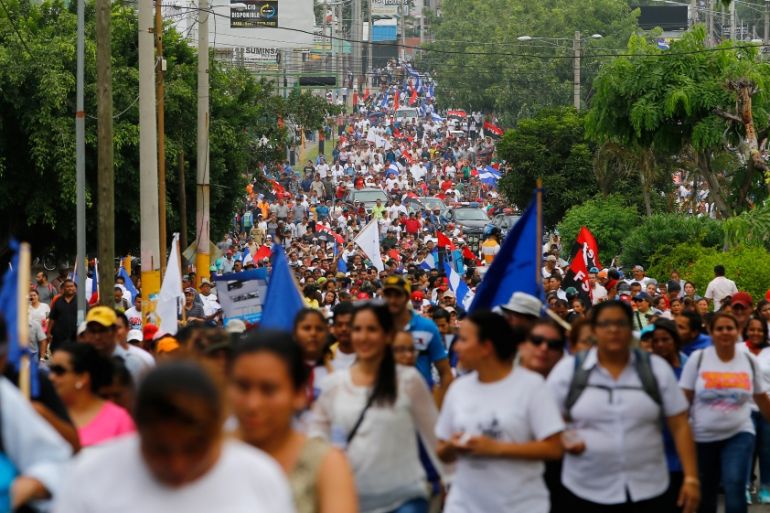Nicaragua unrest: Ortega denies responsibility for deaths
Nicaraguan leader refuses to step down, sayings early elections would ‘make things worse’.

Nicaraguan President Daniel Ortega has reiterated he will serve out his term until 2021, despite more than three months of protests that have seen nearly 300 deaths.
Ortega told Fox News in an interview broadcast on Monday that moving up the elections – a demand of the protesters – would “make things worse”.
Keep reading
list of 4 items‘It feels personal’: Residents fight Melbourne tower block demolition plan
‘Children of the Ganges’ — The boatmen of India’s Varanasi
US senators call on Biden to sanction Sudan’s RSF over human rights abuses
“We were elected by the voters,” said the 72-year-old leader, who has ruled Nicaragua for a total of 22 years since his Sandinista revolution toppled a US-backed dictator in 1979.
“To move up the elections would create instability, insecurity and make things worse,” he said.
Ortega and his government have been accused of using heavy-handed tactics to curb the anti-government demonstrations. Rights groups said authorities have arbitrarily arrested hundreds of people in its crackdown on the protests.
Ortega also said he is ready to continue a dialogue mediated by the Roman Catholic Church, despite his previous attacks on it.
“We invite the Catholic Church to continue with the dialogue so the dialogue can grow and develop in an open manner,” he said.
![Ortega expressed readiness to continue a dialogue mediated by the church [Anadolu]](/wp-content/uploads/2018/07/48d501c390a8441b9133983cf65f54db_18.jpeg)
Last week, Ortega accused Catholic bishops of working with “coup plotters”, saying that disqualified them as mediators.
Pro-government paramilitaries
In Monday’s recorded interview, Ortega rejected allegations that he controlled the pro-government paramilitaries seen acting in concert with the police.
He instead accused Nicaraguan political groups of heading rival anti-government groups, which he said had sought financing from drug traffickers and the United States.
He accused those groups of killing “tens” of police officers in the unrest.
“None of the peaceful demonstrations” have been attacked by police, he said.
The Inter-American Commission on Human Rights (IACHR) has said that during the so-called clean-up operations in and around the city of Masaya there had been a high degree of support and collaboration between police forces and hooded masked armed “parapolice” groups in deploying violence against the population.
Ortega also denied reports by protesters and police that his forces shot dead two young men holed up in a Managua church that came under sustained fire earlier this month.
“No Nicaraguan has died in any church. Not a single Nicaraguan has died in any church. That’s false,” Ortega said.
According to the university students who were holed up in a besieged church, however, 21-year-old Gerald Vazquez died inside the church after he was reportedly shot in the head. A second person reportedly died behind the university barricades.
Nearly 300 dead
The Nicaraguan Centre for Human Rights said on Monday that 292 people have been killed in three months of protests and repression by police and paramilitaries using firearms, raising a previous toll.
The unrest began on April 18 as a protest against a pension reform plan that has since been dropped.
But that anger mushroomed into a broad campaign against Ortega and his wife, Vice President Rosario Murillo, who are accused by critics of running a corrupt left-wing dictatorship.
![Students staged dueling marches for and against the government [Jorge Cabrera/Reuters]](/wp-content/uploads/2018/07/a9f2f6db1cef4a1493f09e723e5d29c8_18.jpeg)
Thousands staged dueling marches for and against the government on Monday. Those opposed to Ortega carried crosses with backpacks hanging from them – symbols of students killed in the unrest. A pro-government student union voiced support for Ortega and referred to protesters as “terrorists”.
The political crisis has hurt the economy of Nicaragua, one of the poorest countries in the Americas.
Standard & Poor’s on Monday downgraded its debt rating for Nicaragua from B+ to B, with a negative outlook.